Unsung Heroes Honoured at 2024 Australian Cycling Luminaries Awards
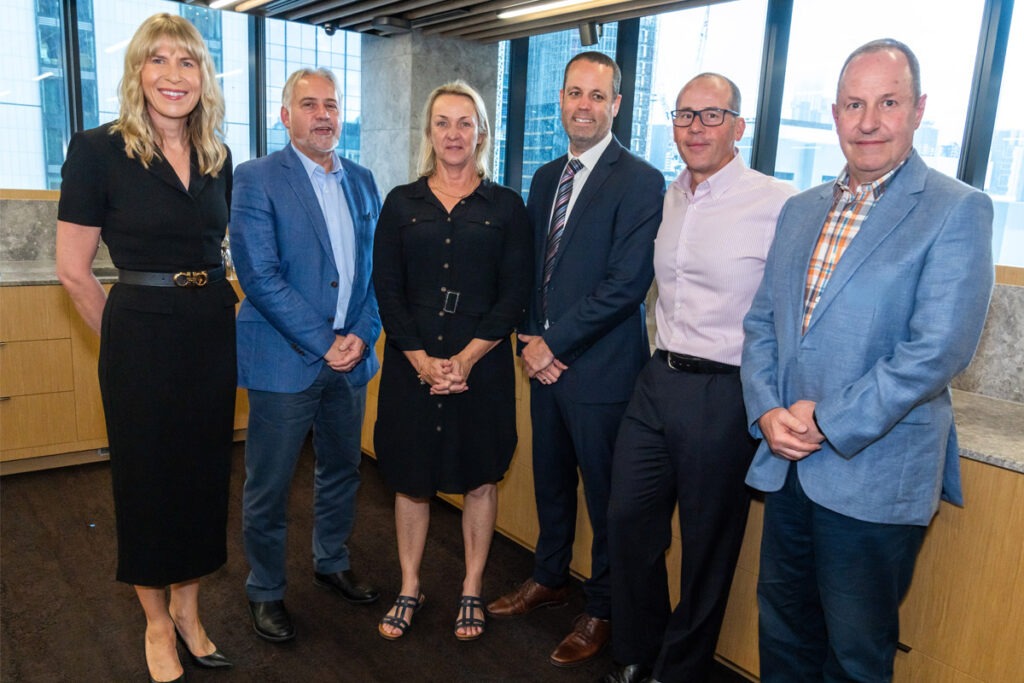
Docklands, Victoria
Since 2002 people who have been responsible for great projects that advance many different aspects of cycling have been honoured at the annual Australian Cycling Luminaries Awards.
This year’s awards were presented at Docklands in Melbourne at Deakin Downtown, a campus of Deakin University.
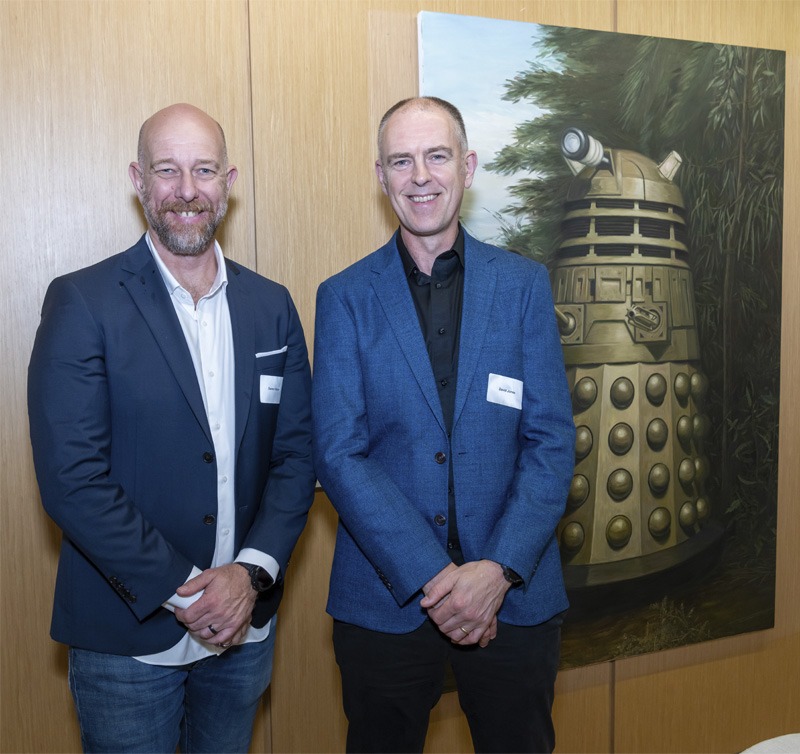
RideScore Active Schools Evaluation Report
Before this year’s awards were presented, Deakin University Professor Neil Coffee officially launched a report on a previous award winning project RideScore, which is based in the Sunshine Coast, Qld.
The program was originally conceived by Sunshine Coast Councillor Colleen Penny who said to the audience, “RideScore – wow, where do I even begin? This has been an eight year journey filled with challenges, growth and incredible rewards. We’ve climbed so many mountains together to reach this milestone tonight.”
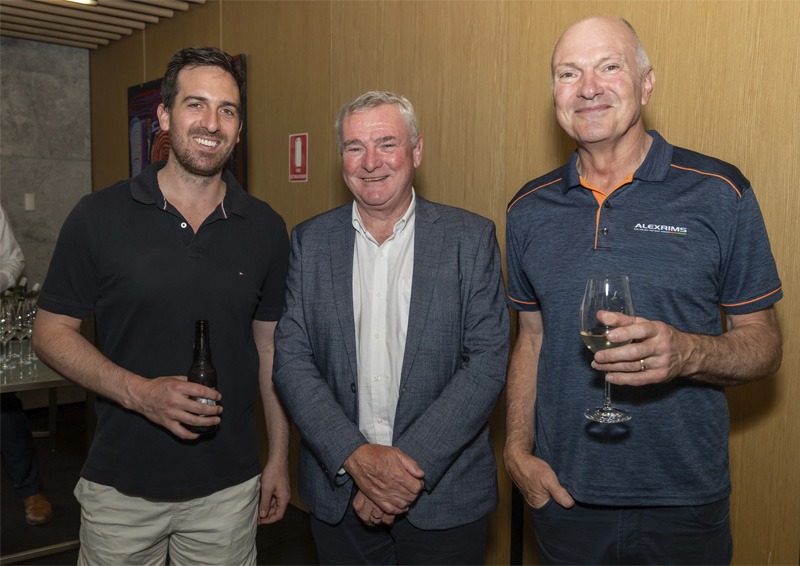
“In 2015 I had an idea. By 2017 I was testing this wild experiment in my son Zac’s primary school in Kyabra, using him and his friends as willing guinea pigs. At the time I only saw about five bikes in parked at the school bike shed. But within a few months of promoting this trial, the number quickly grew to 35 and that’s when I realised we were onto something pretty special.
“Fast forward to today. RideScore is currently delivered in the Sunshine Coast at 11 primary schools. Over 2,600 kids are enjoying the benefits of active travel to school. The data gathered is incredible. But the true heart of the program is what I see and hear on the ground every day.”
Colleen then shared uplifting personal testimonies from some kids and their families who had live changing improvements to their health, self-esteem and independence through riding to school.
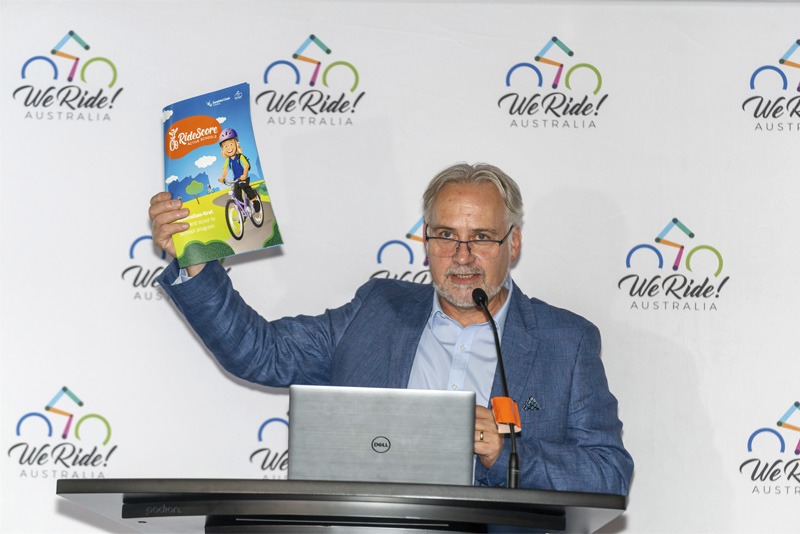
RideScore has been supported by the Sunshine Coast Council and We Ride Australia along with partners SportAus, Stockland and the Federal and Queensland Governments, saw a 55% increase in riding to school across the participating schools compared to a 4% drop across comparison schools.
Specifically, that translated to 57,635 additional individual cycling trips to school during the evaluation period.
RideScore participants are primary school students. They have a beacon fitted to their bikes which automatically emails their parents when they’ve arrived a school and emails them in the afternoon when they leave school. This reassurance helps allow parents to let their kids ride to school.
The program also includes bike education, incentive prizes and “gamification” of the program to make it fun for the kids.
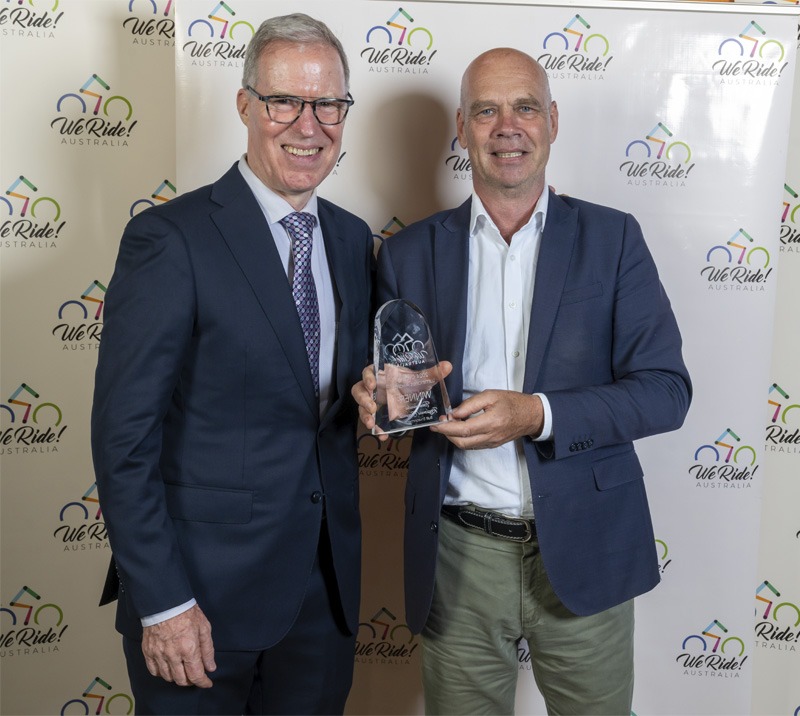
The scheme has received many glowing testimonials from students, staff and parents about improved independence and self-esteem and other benefits.
Professor Coffee then presented his evaluation, of which we’ve detailed a small fraction of the data above. In summarising he said, “This is the sort of program that we should be trying to get our politicians, our local governments, to take on board. One of the biggest problems we have in Australia is chronic disease, which is preventable – it’s termed “lifestyle disease”.
“One of the ways we can help is get kids active at an early age and have behaviour change through adulthood.”
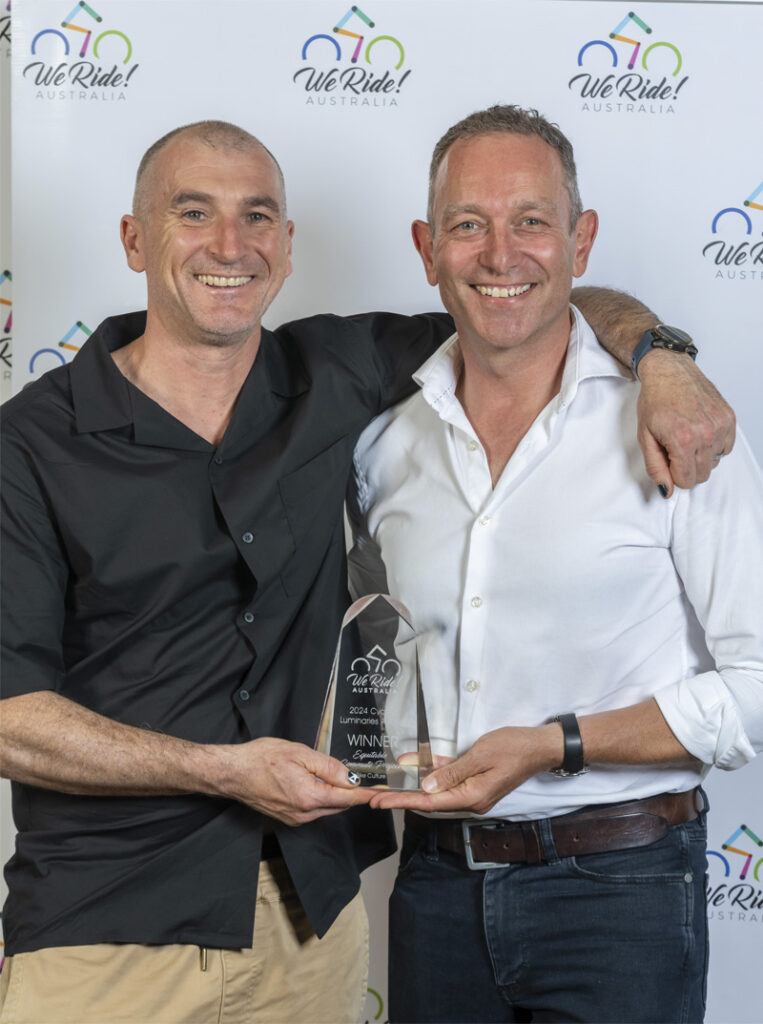
2024 Cycling Luminaries Award Winners
Next the 2024 award winners, who were selected by an independent panel of three expert judges, received their awards. They were:
- Built Environment Award – Toowoomba Safe Streets, Queensland
- Bike Culture Award – Equitable Commute Project, Victoria
- Leadership Award – Anthony Aisenberg
The other finalists for the Built Environment Award were:
- The College St protected bike lane in Sydney which reopened in 2023 after having been first built, then demolished by an anti-cycling state government, then rebuilt.
- The Mary to Bay Rail Trail, a volunteer built 11km project in the Harvey Bay region of Queensland.
- St Kilda Road protected bike lanes. After years of delays, this critical piece of Melbourne infrastructure linking the CBD to coastal St Kilda 4.5 kilometres away, was completed in 2023 and bike traffic is up by 220% since completion.
The winner, Toowoomba Safe Streets refers to Pearce Street, a 30 kph street where cyclists have priority. In accepting the award Brian McKay, Senior Transport Planner at Toowoomba Regional Council said, “Coming from a very conservative town, it took a lot of planning, consultation and convincing. There’s still a large number of traditional engineers out there who want to do “predict and provide” rather than “decide and deliver on the environment that we want”. Hopefully this inspires others to go out there and do these things.”
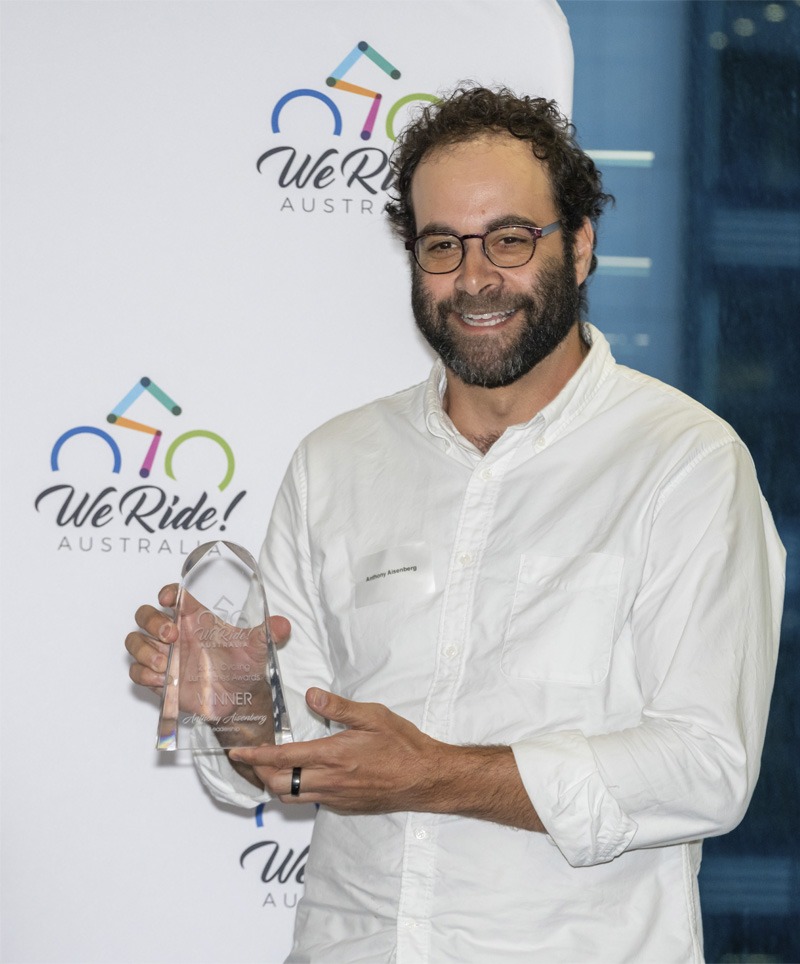
The finalists in the Bike Culture Award were:
- Equitable Commute Project – this collaboration between Good Cycles and RideKola is making a meaningful impact on lives by significantly improving mobility through a safe and active community of eBike users.
- Wheel Sisters – this inspiring program for culturally and linguistically diverse women in the northern suburbs of Merri-bek, Melbourne is breaking barriers and building community.
- Darebin Loves Bikes – inspiring everyday people to become everyday riders, this Council program is highly visible in the local community through local bike check pop-ups and eBike hubs in new affordable housing developments.
- Ausbike – more than 2,000 kids have learned to ride their bikes safely in just the first 12 months since Toby Brown established the program in Western Australia.
Adam Lana from Good Cycles and Chris Arnott from Ride Culture jointly accepted the Bike Culture Award.
Chris said, “Coming into a room like this is so uplifting. It’s a small ecosystem but it’s a powerful one. And that’s what keeps people like us getting up and solving problems with programs like this.
“This came about through covid. The heart of it is putting this form of transport (e-bikes) into the hands of people who otherwise wouldn’t have access to it.”
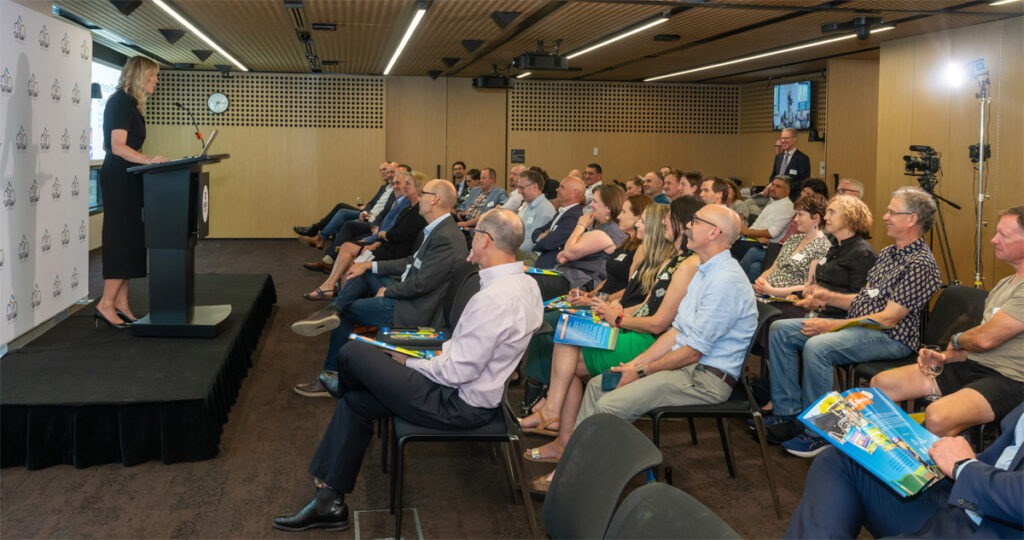
The finalists for the Leadership Award were:
- Jaison Hoernel – the CEO of Good Cycles is using the bike for positive social change and supporting young people who face barriers to employment.
- Anthony Aisenberg – responsible for Australia’s largest crowd-sourced bike data project BikeSpot, and the smash hit ‘unconference’ Transport Camp, Anthony brings his expertise and passion to create better connections for vibrant cities.
- Sarah Cleggett – Sarah started Kidical Mass Adelaide in 2021 with the ‘Babes on Bikes’ protest ride and has become a voice for safer school zones and crossings.
“BikeSpot was born out of noticing that bike lanes weren’t being prioritised in the locations where people really needed them,” said the winner Anthony Aisenberg. “I thought, “Why don’t we capture the collective knowledge of existing riders?” Because they know every little bump and narrow section. Then we can pass that information on to the advocates, planners and designers that need that information to make better decisions.”
10,000 people from across Australia contributed information to BikeSpot’s most recent campaign. You can see more at www.bikespot.org
“My next mission is to do it again in BikeSpot 2025,” said Anthony. “Then we can compare the data over time in a consistent format and prioritise safe cycling improvements.”
This article was previously published in The Latz Report.
